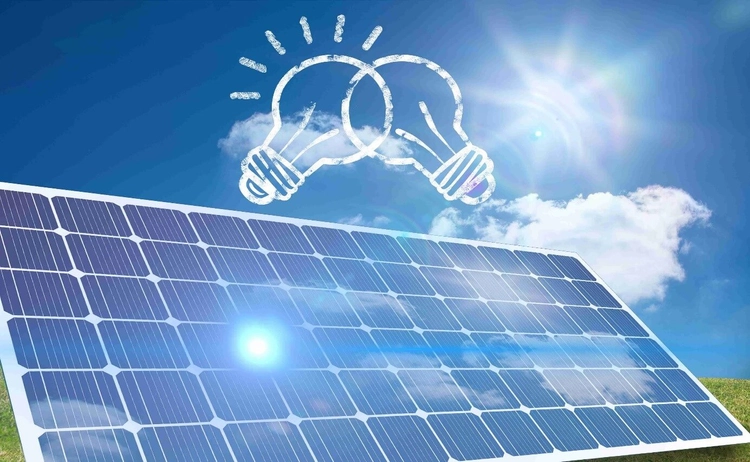It’s a fact that there are numerous advantages to solar energy, such as a long lifespan, significant savings on electricity bills, and increased property value. However, it’s crucial to also be aware of its disadvantages to assess whether this resource makes sense for your project.
Explore the advantages and disadvantages of solar energy here, understand why solar energy is experiencing constant growth in Brazil and worldwide, and determine whether it’s worthwhile to install it in your home or business.
The definition of solar energy is associated with photovoltaic energy, a technology that uses sunlight as a source of energy to generate electricity. Despite the initial high cost, it has the advantage of being free, renewable, alternative, and clean.
Solar energy operates by capturing sunlight through photovoltaic solar panels, offering advantages such as easy maintenance and potential savings of up to 90% on electricity bills, despite the initial high cost.
The key advantages and disadvantages of solar energy include a lifespan of at least 25 years, generating savings of up to 90% on electricity bills, paying for itself within approximately 7 years, even though it doesn’t generate energy at night or during power outages when the system doesn’t use batteries.
Solar photovoltaic energy has its own set of advantages and disadvantages, such as easy access to electricity in remote areas, although off-grid systems have limited storage capacity as they are still in development.
Solar photovoltaic power plants also have pros and cons, with durability exceeding 30 years, despite high initial costs, and occupying minimal space, even though they have lower energy production compared to thermal power plants.
What are the Advantages of Solar Energy?
Solar energy is non-polluting, renewable, clean, and silent. It can be used in areas isolated from the power grid, requires minimal maintenance, is easy to install, and is cost-effective to maintain.
Advantages of Solar Energy:
Solar energy brings forth a multitude of advantages, making it a compelling choice for sustainable power generation:
Non-Polluting and Renewable:
Solar energy is non-polluting, renewable, and clean, providing an environmentally friendly alternative to traditional energy sources.
Alternative to Oil:
It serves as a viable alternative to oil, reducing dependence on non-renewable and environmentally harmful fossil fuels.
Silent Operation:
Solar power systems operate silently, contributing to a quieter and more peaceful energy generation process.
Free Energy Source:
The sun, the source of solar energy, is free, making solar power an abundant and cost-effective energy source.
Cost-Effective Photovoltaic Systems:
Photovoltaic solar energy is one of the most cost-effective self-generation systems, offering significant savings compared to other energy sources.
Low Maintenance Needs:
Solar energy systems have minimal maintenance requirements, reducing the need for ongoing and costly upkeep.
Easy Installation and Affordable Maintenance:
They are easy to install and cost-effective to maintain, making solar energy accessible to a wide range of users.
Long Lifespan and Rapid Payback:
With a lifespan exceeding 25 years, solar systems can pay for themselves in as little as 7 years, offering long-term financial benefits.
Up to 95% Energy Bill Savings:
Solar power can result in substantial savings, with the potential to cut energy bills by up to 95%, contributing to financial efficiency.
Price Reductions Due to Technological Advances:
Advancements in technology have led to a significant drop in solar equipment prices, making it more affordable and accessible.
Weather-Resistant Solar Panels:
Solar panels are resilient to weather conditions, ensuring durability and reliability even in challenging environments.
Applicable in Off-Grid Areas:
Solar energy can be effectively utilized in isolated areas without access to the traditional power grid, providing energy independence.
Recyclability of Photovoltaic Equipment:
Photovoltaic equipment, including solar panels, can be recycled, aligning with sustainable practices and reducing environmental impact.
Embracing solar energy not only addresses environmental concerns but also offers practical and economic advantages, contributing to a cleaner and more sustainable energy future.
Additional advantages of solar energy include its low environmental impact, simple installation, low cost compared to its lifespan (over 25 years), and the ability to serve as a substitute for conventional electrical energy in regions without distribution.
Solar energy stands out as one of the most sustainable sources globally, being both renewable and clean, emitting no pollutants or utilizing scarce natural resources.
Photovoltaic energy also contributes to reducing noise pollution. Its operation is silent and discreet, avoiding the production of unpleasant sounds.
This type of energy generation system does not require exhaustive maintenance; occasional cleaning is sufficient. Moreover, its raw material – sunlight – is inexhaustible and free.
Solar panels can last up to 25 years, paying for themselves in just seven years. The resulting savings can reach up to 90% of the total electricity bill, making it a highly intelligent investment that also contributes to property appreciation.
A study by the Lawrence Berkeley National Laboratory in the U.S. indicated that a property with solar energy experiences a 4% to 6% increase in value.
Solar panels are also an excellent option for residences in isolated areas outside the power grid. Off-grid systems use batteries to store energy captured by the panels, ensuring power even on rainy days or during the night.
Photovoltaic energy systems are also sustainable in their disposal. According to the International Renewable Energy Agency (IRENA), up to 97% of these materials can be recycled and used in the production of new modules. Among them, glass is the most predominant, constituting 75% of the total product composition.



